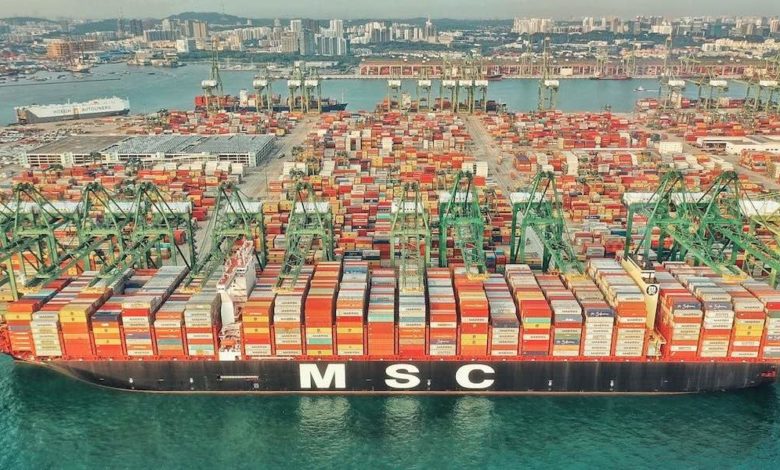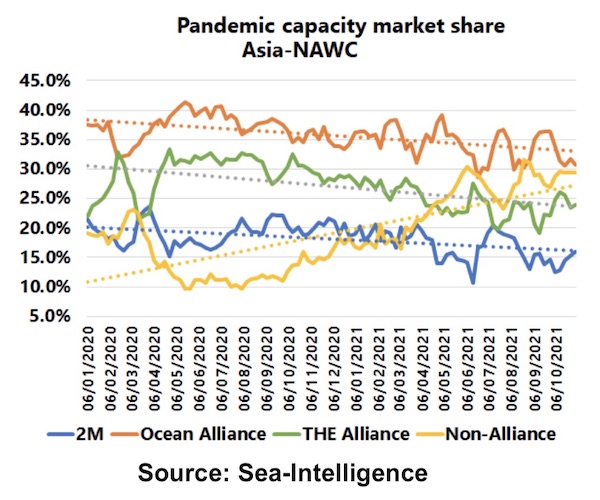New analysis shows the fierce fight between alliances for market share on the main east-west trades

While competition authorities and shipper bodies allege collusion among carriers in today’s record, sky high freight rate environment, new analysis from Sea-Intelligence shows the fierce competition for market share between the world’s three global east-west alliances.
Since the start of 2020, 2M, the Maersk, MSC grouping, has lost capacity market share to the Ocean Alliance on Asia-North Europe and to both the Ocean Alliance and THE Alliance on Asia-Mediterranean.
The Ocean Alliance is made up of CMA CGM, Cosco and Evergreen while THE Alliance features Hapag-Lloyd, HMM, Ocean Network Express (ONE) and Yang Ming.
It is on the transpacific where the greatest changes in market shares have taken place recently. All three carrier alliances have lost capacity market share to non-alliance services with a host of new names entering the red hot tradelane, deploying whatever sized tonnage they can muster.
The capacity market share of non-alliance services on the transpacific is now higher than both THE Alliance and 2M
Remarkably, the capacity market share of non-alliance services is now higher than both THE Alliance and 2M, and is now equal to roughly 30% of all transpacific deployed capacity, according to Sea-Intelligence data (see chart below).
“Contrary to complaints of a market understanding between carrier alliances, our analysis shows that the carrier alliances are indeed fighting for capacity market share on the Transpacific and Asia-Europe trades. This is even evident during the turbulent pandemic-hit one and a half years,” Sea-Intelligence stated in its most weekly report.
Regardless of this new analysis, many are deeply frustrated with the state of liner shipping and the power the three alliances have.
At the start of this month an American furniture shipper filed a $600,000 lawsuit with the Federal Maritime Commission (FMC) against a couple of global containerlines, which it claims have repeatedly contravened terms of the US Shipping Act.
Pennsylvania-based MCS Industries, whose clients include Target, Walmart, Home Depot and Lowe’s, filed the suit, mentioning both Cosco and Mediterranean Shipping Co (MSC).
MCS said carriers had “unjustly and unreasonably” exploited customers, and had colluded to manipulate the market.
“Global ocean carriers began taking parallel and strikingly similar actions to prop up ocean carriage pricing and improve their profitability at the expense of shippers and the public,” MCS maintained, suggesting this collusion was made possible by the fact that there are now just three alliances that dominate more than 90% of the main east-west tradelanes.
“These collusive ocean alliances give Respondents venue and opportunity to co-ordinate discriminatory practices such as those alleged herein to violate contracts with shippers like MCS in favour of exploiting profit opportunities on the spot market,” the suit alleges.
On August 10, a bipartisan pair of lawmakers, pressed by agricultural exporters, introduced the Ocean Shipping Reform Act into Congress, a bill which would put in place new minimum requirements for service contracts and give the Federal Maritime Commission (FMC) greater powers.
California Democrat John Gerimundi, a co-author of the bill, hit out at what he sees as an oligopoly in container shipping.
“The problem was severe, the control of the shipping by a handful or two handfuls of ocean carriers, really eliminated the competition that had been in place for many, many years prior to the increased consolidation,” Gerimundi said.


Break them up!
Why break up entities that have kept costs low for years? Why not break up the bleaters Target, Walmart, Home Depot and Lowe’s? They made and still make immense profits ripping off their customers
Would it not have been useful to list the non-aligned carriers on the Transpac, so we can all see who is allegedly gaining market share?
There seems to be a misunderstanding in the outside world about the role and freedoms of the Alliances (formerly known as consortia, etc). The shipping lines may share space and scheduling but they are not allowed (and never have been under Anti-trust legislation) to discuss rates. They load on each other’s vessels and largely use their own container fleets and chassis but only co-ordinate sailings and bookings within tonnage agreements and space allocations. If the market prices are increasing then all boats rise on an incoming tide and all the prices increase.
That may be painful for shippers and BCOs but it is a function of free market economics.
If MCS Industries and their clients, as well as the agricultural exporters are so sure of their belief that prices are too high and that their is pricing collusion, then they should publish the evidence of that. Clearly they have the collective muscle to start up a competing shipping service (a lot of noise was made when Walmart rented a few slots on con-bulkers to cabotage their new-build 53′ boxes) so why don’t they do that instead of bleating about the unfairness of the free market?
Couldn’t agree more. The bleating firms became what they are profited from the economic system they now bleat about. Interestingly it is the USA, alleged home of the free and true capitalism where the bleaters exist.